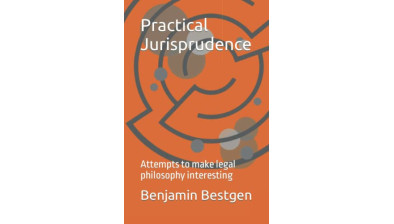Benjamin Bestgen: Law in science fiction and fantasy

Benjamin Bestgen
In the thirtieth article in our jurisprudential primer series, Benjamin Bestgen takes a look at fictional legal systems. See his last entry here.
Early readers of this series may recall my article about depictions of law in utopian fiction. What stood out was that utopian writers had little use for the law: in an ideal society, the need for law would be minimal. Education, resource distribution and social harmony would be such that most legal issues either wouldn’t occur, be treated as medical problems or could be resolved by mediation and reasonable compromise.
Utopian concepts aside, popular legal fiction uses actual or historic legal systems: think about John Grisham’s novels or the Shardlake series by C.J. Sansom. Some comic books set in our world, like Daredevil or She-Hulk, feature the protagonists as practising attorneys, next to their superhero/vigilante gigs. But what about entirely fictional legal systems? What could they look like?
Star Trek Universe
Law professor Jon M. Garon notes that Star Trek has generated the largest body of scholarly work about its legal system. Looking at the Federation alone, the Star Trek universe deals with interplanetary law and diplomacy, criminal law, rules on marriage, property and personhood, time travel, courts martial, extrajudicial action, space and admiralty law, trade and even constitutional issues. We also see examples of honour-based, martial Klingon justice or complex and loophole-riddled Ferengi law, codified in the Rules of Acquisition.
Analyses of legal matters in Stark Trek have been comprehensively covered by people way more familiar with it than I. Garon notes, for instance, Robert H. Chaires and Bradley Chilton’s Star Trek Visions Of Law And Justice (University Of North Texas Press, 2004).
The First Law
Joe Abercrombie’s First Law world introduces Sand dan Glokta, an increasingly powerful member of the Inquisition in The Union, a prominent kingdom. While a court system and a High Judge exist, the Inquisition seems to be the prominent executive power. They act as a secret police and intelligence agency, run prisons, interrogate suspects, investigate and punish treason and guard the safety of The Union by all (often questionable) means necessary.
Inquisitors enjoy vast discretionary powers regarding the cases they handle and how they treat persons of interest. They are commanded by an Arch Lector, who sits on the Closed Council, the actual ruling body of The Union. While rich and noble persons may sometimes be able to appeal to the King’s mercy or debate their case in the Open Council, commoners are largely powerless and few people can ultimately escape the Inquisition’s judgment.
Lawyers appear to exist in that world but their exact role and influence is not much explored. The character Temple works as contract lawyer for a mercenary company but “consensus in idem” or “good faith” are rather fluid concepts in the Company of the Gracious Hand…
Judge Dredd
This dystopian comic series deals with a society living in overpopulated megacities where crime and disorder are the norm. Justice is dispensed by the Judges, legally trained personnel acting as police force, judge, jury and executioner in one. Judges know the law by heart and are expected to dispense justice without fear or favour. Judgements tend to be enforced immediately – often imprisonment in “Isocubes” or the death penalty. There is usually no appeal against a Judge’s sentence and citizens in the megacity mostly try to avoid coming into contact with Judges at all.
Corruption can be a problem amongst Judges and the concept of “fair trial” is at times stretched to breaking point. Lawyers are rare in Judge Dredd’s universe, acting normally only for the wealthiest of people.
Dune and ConSentiency Universe
Frank Herbert is mainly known for his Dune universe, which does not deal much with legal issues as such. The universe is governed by an Emperor who depends on the support of a sufficient number of powerful noble houses in the Landsraad, a kind of galactic senate. Conflicts are solved by force, intrigue, vendetta, espionage and treachery. Later in the series, the universe comes under the rule of Leto Atreides II, the God Emperor, who establishes a theocratic dictatorship to rescue humanity from itself.
But interesting laws exist, such as a prohibition on “thinking machines” or enforced neutrality on all SpaceGuild heighliner starships. Some drugs, like the Hypnobong, are prohibited and Leto II outlaws certain protective shields, as they can cause vast explosions when fired upon with laser weapons.
In Herbert’s other works like Whipping Star and The Dosadi Experiment, we encounter Jorj X. McKie, who is the only human admitted to practise law before the Gowachin (an alien culture) bar. He also works as a Saboteur Extraordinary for the Bureau of Sabotage, a public agency tasked to protect the collective sentiency and individual dignity from corporate and other governmental overreach and abuse in a world where bureaucracy has truly spun out of control.
The Dispossessed
Ursula LeGuin’s famous novel introduces two worlds, one founded on the primacy of private property rights and one without them. Lawyer and author Christopher Brown notes that while the story does not make a legal system explicit, the stark differences in the rules guiding social behaviour, commerce, work relations and government on each world are so prevalent in each chapter that the invented laws become very clear to the reader. Brown makes a similar point about Margaret Atwood’s The Handmaid’s Tale, where a theocratic government used the law to deprive fertile women of most of their civil and reproductive rights.
There are more examples of law in science fiction and fantasy but Brown observes that generally, science-fiction and fantasy could do more to zone in on the law as a topic worthy of making it more explicit. By imagining legal systems, constitutions and laws for fantasy worlds, we engage in a creative process to come up with ideas of rules for worlds we would actually want to live in.
Benjamin Bestgen is a solicitor and notary public (qualified in Scotland). He also holds a Master of Arts degree in philosophy and tutored in practical philosophy and jurisprudence at the Goethe Universität Frankfurt am Main and the University of Edinburgh.






